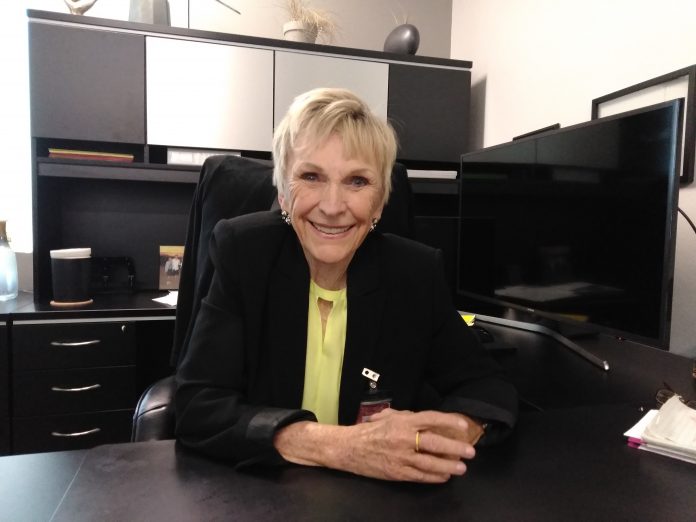The McAlister Institute organized its sixth annual 5K Walk for Sobriety event on Sunday, July 8 to celebrate 41 years of existence under the guidance of its Founder and CEO, Jeanne McAllister.
The event took place at Naval Training Center Park at Liberty Station with check-in at 8 a.m.
The goal was to raise awareness about alcohol and drug addiction and also to raise funds to support the recovery services provided by the McAllister Institute.
This organization has helped hundreds of thousands of individuals impacted by addiction since opening its doors in 1977.
The McAlister Institute organized its sixth annual 5K Walk for Sobriety event on Sunday, July 8 to celebrate 41 years of existence under the guidance of its Founder and CEO, Jeanne McAllister.
The event took place at Naval Training Center Park at Liberty Station with check-in at 8 a.m.
The goal was to raise awareness about alcohol and drug addiction and also to raise funds to support the recovery services provided by the McAllister Institute.
This organization has helped hundreds of thousands of individuals impacted by addiction since opening its doors in 1977.
McAllister is the recipient of numerous awards and recognitions for her lifetime of service.
The McAllister institute was a result of the founder’s own recovery. Jeanne McAllister started drinking at a very young age due to peer pressure, went into recovery when she was 24 years old and has been sober for the past 61 years.
McAllister said she believes that it is nobody’s fault when somebody becomes an addict.
“You don’t know you’re an addict until you use alcohol and drugs and can’t stop,” she said.
McAllister believes that sometimes addiction happens gradually and sometimes it is instant.
“With me, it was right away,” she said. “I just drank too much right from the very beginning. I didn’t choose to be this way.”
She believes addiction is a disease and that scientists are struggling to find the cause.
McAlister said addiction was something she struggled with even after 52 years of sobriety. Even a bottle of beer a guest left in her refrigerator might tempt her.
“You eat string beans and get sick, you never eat string beans again, right?” she explained. “But me as an addict, I am looking at this bottle of beer and say, wow, I wonder what this beer tastes like.”
McAllister said she believes acceptance is the key.
“People have to accept when they find out they have a problem with drugs and alcohol that they are different and they cannot use anything,” she said. “I don’t use anything. I’ve been addicted to candy. I eat one Reese’s Peanut Butter, I am gonna eat the whole bag. I’ve been addicted to shopping. I don’t gamble, because I am afraid I am going be addicted to it.”
McAllister is not concerned with the cause of addiction, but with the ways to prevent people from relapsing.
Talking about choice and personal responsibility in the era of readily available information about the consequences of alcohol and drug use, McAllister believes information is not enough to counterbalance the culture and peer pressure that normalizes drinking and using drugs.
“This was World War II, drinking was so much part of the living, “ she said, pointing out that drinking is still very much part of our society. “I wanted to drink with the other kids and be like them, but I couldn’t handle it and it took me away from my family and values and put me in a very, very dark-dark place very early.”
McAllister went into recovery when she was 24 years old, one of just three other youngsters in San Diego in rehab at that time.
“Most of the people at that time had grey hair,” she said. “Sometimes they said to me, ‘go out, little girl, and drink some more because we drank even longer than you are old.’ So, it was difficult to fit in with them.”
The Institute is now helping people of all ages, making it easier for young kids to relate and support each other during the recovery. The youngest are 12 years old and some of them started using when they were eight years old.
While believing that spreading accurate information about addiction, drugs and alcohol is a good practice for prevention, McAllister does not think information alone would be able to prevent young people from using.
“As a teenager, you really think you’re invincible and that these things are not going to happen to you,” she said.
Then, what works?
McAllister noticed that kids are greatly influenced by the way their addiction affects their family relationships.
“We asked people what is important to them in their sobriety and I thought it’s going be having a job, a house, a car, but it was about none of those things,” she said. “It was about being a mother again, a father, a brother, it was about family, that’s very important to us, to be reunited with the family.”
McAllister said prevention starts and ends with the family, especially with the parents.
“Today, television and social media are more involved with the children than the parents a lot of times,” she said.
McAllister said one way to make sure kids stay out of trouble is to provide them with a structure and boundaries and also to be involved in their lives, to listen to them and be connected.
“Another important thing is that we have to watch our own drinking and smoking habits and have a balance, show them there are two sides,” she said. “A lot of kids come and say, I didn’t know there is another way to live, because it was so prevalent in their childhood and their homes. I think parents should demonstrate to their children that it’s ok to not drink.”
To this day, after decades of sobriety, McAllister still feels the need to pretend her glass is filled with alcohol at parties to avoid people’s questioning and pressuring. She remembered going to a baseball game once and having a man who was sitting next to her move away when she said she does not drink.
McAllister said she has several wishes on her bucket list and one of them is to research the anti-smoking campaign, as she believes the success of having cigarettes banned from most public places is a recipe that needs replicated with the drugs and alcohol.
“Drugs and alcohol kill more people than cancer and look how many got behind breast cancer.”
She is also against legalization of marijuana, because she believes it is a gateway drug and will create even more addicts.
“One thing that concerns me is people driving under the influence of marijuana because we all know the motor skills are not the same,” she said.
McAllister said the opioid crisis compounds the problem of addiction, saying, “It’s just a drug and alcohol society we live in. We don’t teach people how to live their life without anything, very simple.”
She said people must stop making fun of non-users and also to say something when they see somebody abusing drugs and alcohol, to help them seek help.
McAllister said her biggest regret in starting the institute is that it took her away from her family when working 10-12 hours every day, seven days a week.
One of the highlights of her career was meeting Oprah when the TV host interviewed several pregnant women who were in recovery at the McAllister Institute.
“She was wonderful,” McAllister said. “She took her shoes off, was very much down to earth, very non-threatening, warm and compassionate.”
At 85-years-old, McAllister has big plans for her institute and said she could not have done it without her team of “passionate and compassionate people who work their hearts out for very little money to carry the message forward.”
She credits good people and God for helping her to get this project off the ground.
“God has always helped and protected this organization and always will,” she said. “Not a particular god, but a higher power.”
Her legacy is going to be carried forward by her granddaughter, Marisa Varond, 29, who has been working for the organization for the past six years.
The Institute is now moving forward with a new delivery system, working with Drugs Medical, to provide more services.
McAllister does not have any plans to retire.
“I see myself sitting here at my desk doing the same thing I’ve been doing for forty something years and being inspired by the people I work with then plopping over and dying,” she said with a laugh. “But you don’t need to put that in.”
For more information about the institute, visit www.mcalisterinc.org. and check out the website at www.walkforsobriety.com if interested to participate in the Walk For Sobriety event on Sunday.














